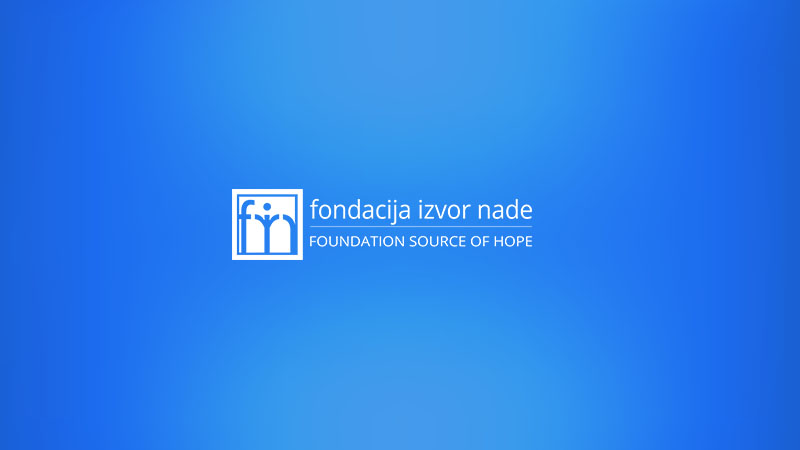
Aldin Kovačević, a scholarship holder and activist of the Source of Hope Foundation, chose IT for his profession. It is a passion he has nurtured since he was a child. He programs, teaches and studies.
Aldin’s key to success, he says, is the proper allocation of time and responsibilities. With clear goals and motivation for your actions, it is much easier and more effective to organize time.
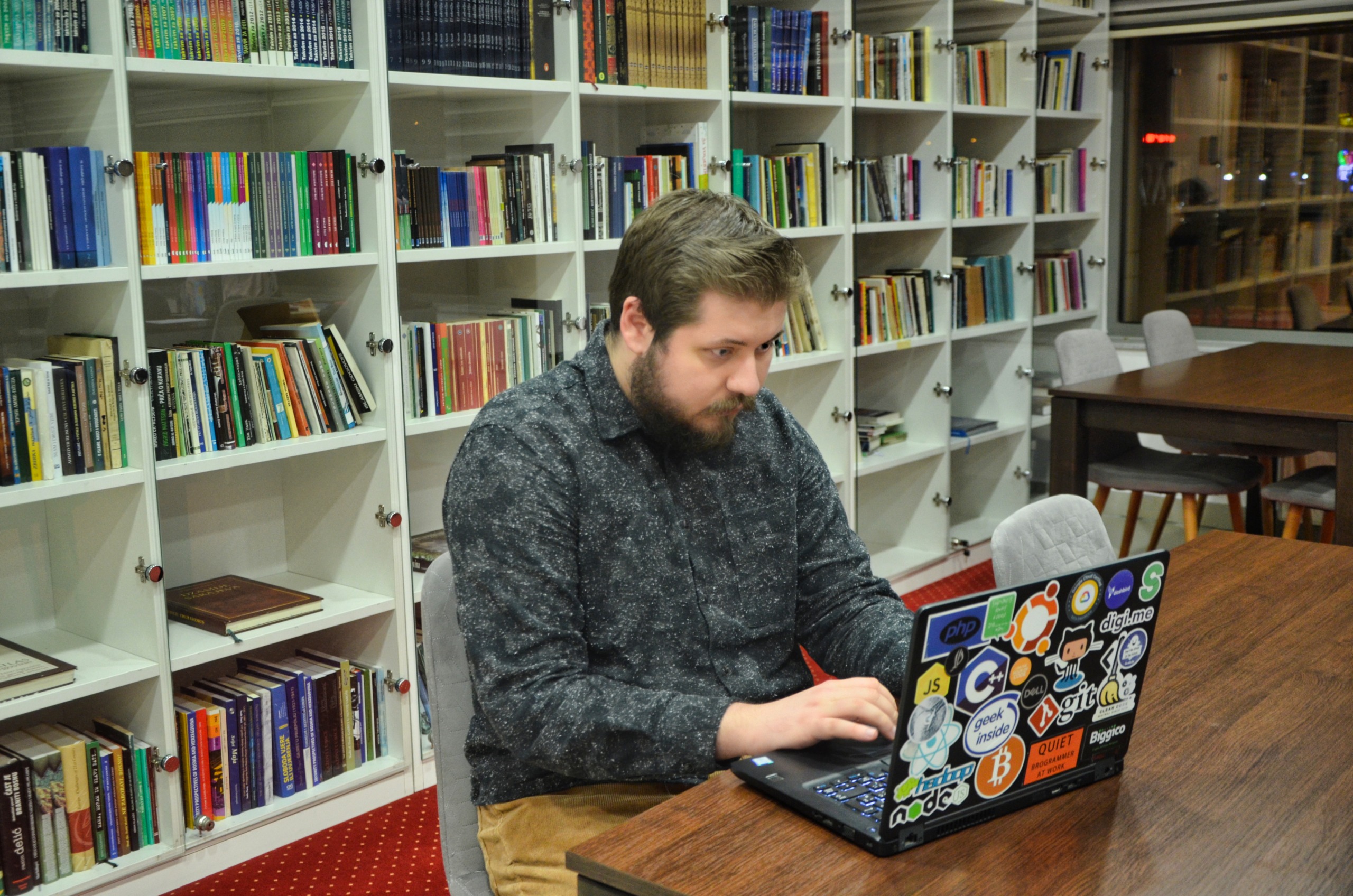
Where does the love for IT come from? Why was that your first choice?
My love for IT developed when I first got introduced to the QBasic programming language in elementary school. By the way, I have always loved to think analytically and find solutions to various problems. When I first became familiar with the concept of programming and realized that I could actually “teach” a computer to do what I wanted and help me solve problems, I knew it was something I would love to do in the long run.
You finished the first cycle of information technology studies as a golden student? How does it feel to be named the best student of a generation?
The nomination as the best student in the generation was an exceptional part for me. Honestly, when I first applied for the competition for the student of the generation, I did not expect to take that title. When I learned that I would be a student of the generation, I was first very surprised and then very happy. Although I never studied nor performed academic obligations for some “recognition” or award, it was nice to see that my work and commitment was recognized by others. In addition, I had the pleasure to take the title of student of the generation as the first student from the IT department in the last couple of years. I am glad that I was able to achieve this success not only for myself, but also on behalf of the entire Department. In the end, when I gave a speech to all the gathered students and guests on behalf of our generation, I hoped (and I hope the same today) that my success and commitment will serve as inspiration for generations to come, and that my acquired knowledge will not remain only symbolic on that “golden badge”, rather than actively using it to improve my community.
You are currently pursuing a master’s degree in IT. You are hired as an assistant at the faculty, but you also work in industry. How do you manage to organize everything?
From the beginning, I admit, it was a little difficult to coordinate all the obligations. However, the proper allocation of time and commitment is crucial. Once the “daily rhythm” is established, and if we adhere to it for a couple of weeks, all obligations and activities simply become a habit. As for my time, I spend most of my days at work. I have arranged free time with my employer when I have classes at the university (as an assistant), and my master’s classes start after 5 pm, so I arrived at it undisturbed. I use a certain part of the weekend to do the “free hours” from the previous week, and prepare exercises and other materials for next week’s assistantships. In addition to this, I use my free time throughout the week to work on my master’s thesis, part by part. In addition to a good allocation of time, I believe that one more thing is key to reconciling all obligations: clear motivation and understanding why we do the things we do. I have set clear goals for each of my responsibilities: at work I want to be as efficient as possible and do all the tasks in the best possible way; as an assistant, I want to explain the given material to my students in the simplest and most accessible way possible; I want to finish my master’s studies with the best grades, and write an innovative and useful final paper. When we have clear goals and motivations for our actions, it is much easier and more effective to organize time in order to fulfill everything.
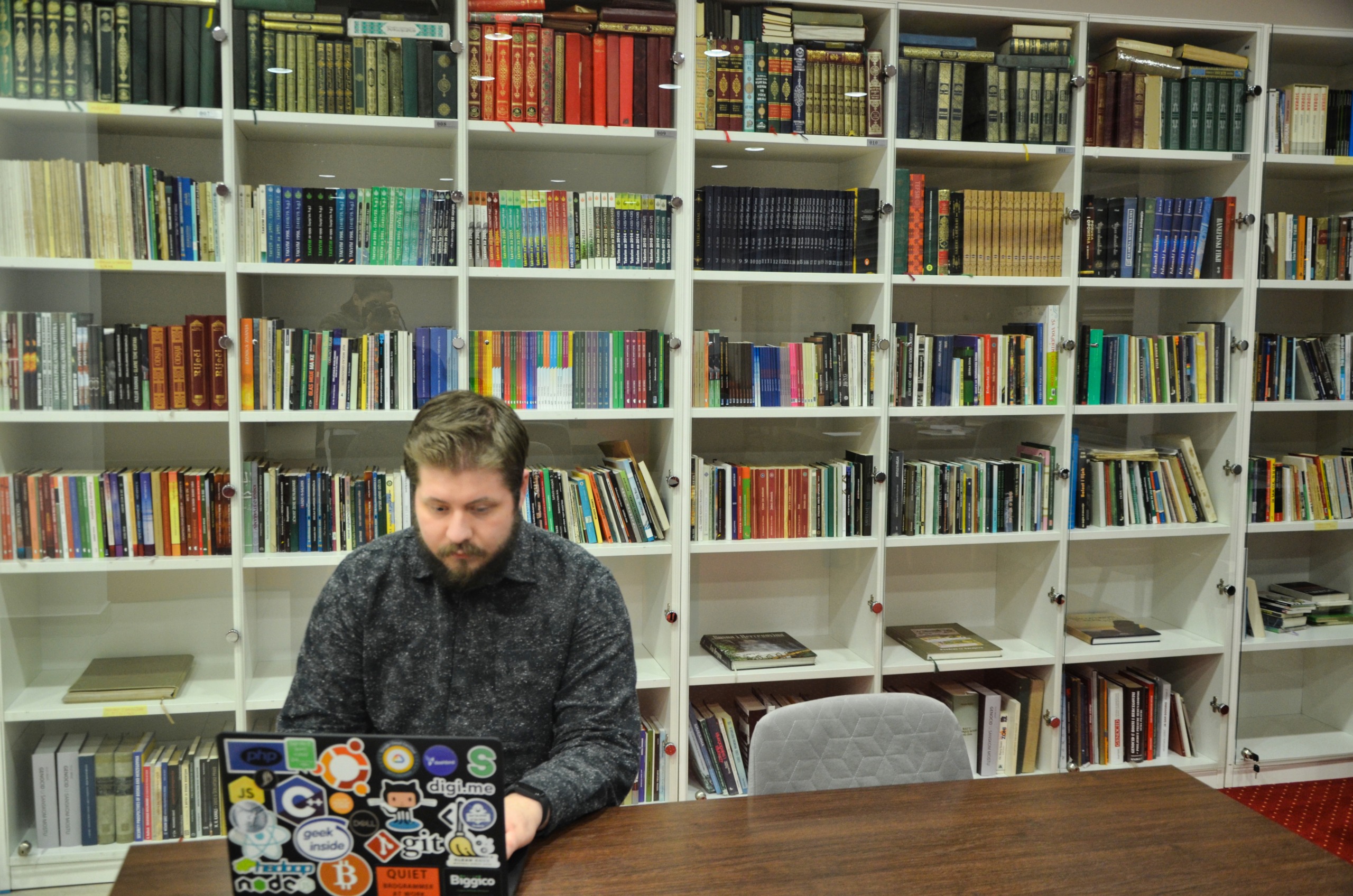
What projects are you currently working on? Are they exclusively projects in the field of information technologies or other areas as well?
Yes, I have to say that I mostly deal with IT projects; more precisely, by applying information technology to real-life problems. We are currently working for US clients on a real estate and stock digitization project using blockchain technology (unfortunately, due to your contract, we are not allowed to talk about the details of the project). In addition, work on a project conceived as a platform for freelancers (demand and offering of various services) where payment for jobs is made through cryptocurrencies (e.g. Bitcoin). In addition, as part of my master’s thesis, I am working on a project of automatic summarization of texts in the Bosnian language. These would be some of the more important projects we are currently working on. Of course (I guess, like any programmer), in my spare time I work on hobby projects in various IT areas, in order to hone my programming skills and learn something new.
We need to look at your “Vote Chain” project, which was an inspiration to you to write your dissertation, which aims to prevent electoral fraud in our country. Can you tell us more about the project, how long you worked on it and is there any hope that it could be accepted and realized in some of the next elections in our country?
VoteChain is a project I designed as part of my undergraduate thesis, and it was conceived as an online voting platform that uses a blockchain. Blockchain is the main technology used in cryptocurrencies, such as Bitcoin and Ethereum. Blockchain is, simply put, a publicly available and distributed database to which new data can be added, but already existing information cannot be modified or deleted. In the context of cryptocurrencies, this means that every transaction made remains permanently stored and visible to everyone, without the possibility of someone canceling it or saying that it did not happen. I got the idea to apply this concept to the voting at the end of 2018, in the period after the General Elections, while I was still looking for a topic that I could work on for graduation. On TV and other media, I often heard stories about stolen votes, invalid ballots, voter frauds, etc. And then I came up with the idea: since accuracy and transparency are such an important factor in elections, why not use technology that is publicly available, accurate, and doesn’t allow data to be changed once it’s created? This is how the concept of VoteChain came about: if we treated votes (i.e. ballots) as data entering the blockchain, they would be permanently and irrevocably preserved. In other words, it would be impossible to claim that the votes were stolen, altered, miscounted, etc .; every voice would undoubtedly be there. Using a few more blockchain-related technologies, the voices would be not only irreplaceable, but also anonymous. Thanks to cryptographic functions, although all votes would be publicly visible, no one but the original voter could “recognize” whose ballot is whose.
One could write about this topic for a long time, and the very nature of blockchain technology, but this brief review presents the main concepts and ideas behind VoteChain. I worked on the project for about eight months (although I had been working with the blockchain technologies for a couple of months before the idea for the project), and in the end I defended it with a maximum grade. In terms of acceptance and realization, I would sincerely like that the project meet any interest or use. And I have to admit that this project was done as a “proof-of-concept”: I wanted to prove that something like this is feasible and cost-effective, which I think I succeeded. Of course, there are still a lot of things that could (and should) be improved and further designed within the system itself, but I think that the initial project did its job. I am not sure if it is “in everyone’s interest” for the voting process to be irreplaceable, fast and transparent. I sincerely wish it was. In the meantime, I received a proposal to try to use the system, e.g. in elections within companies or organizations, which I may try when I have more time.
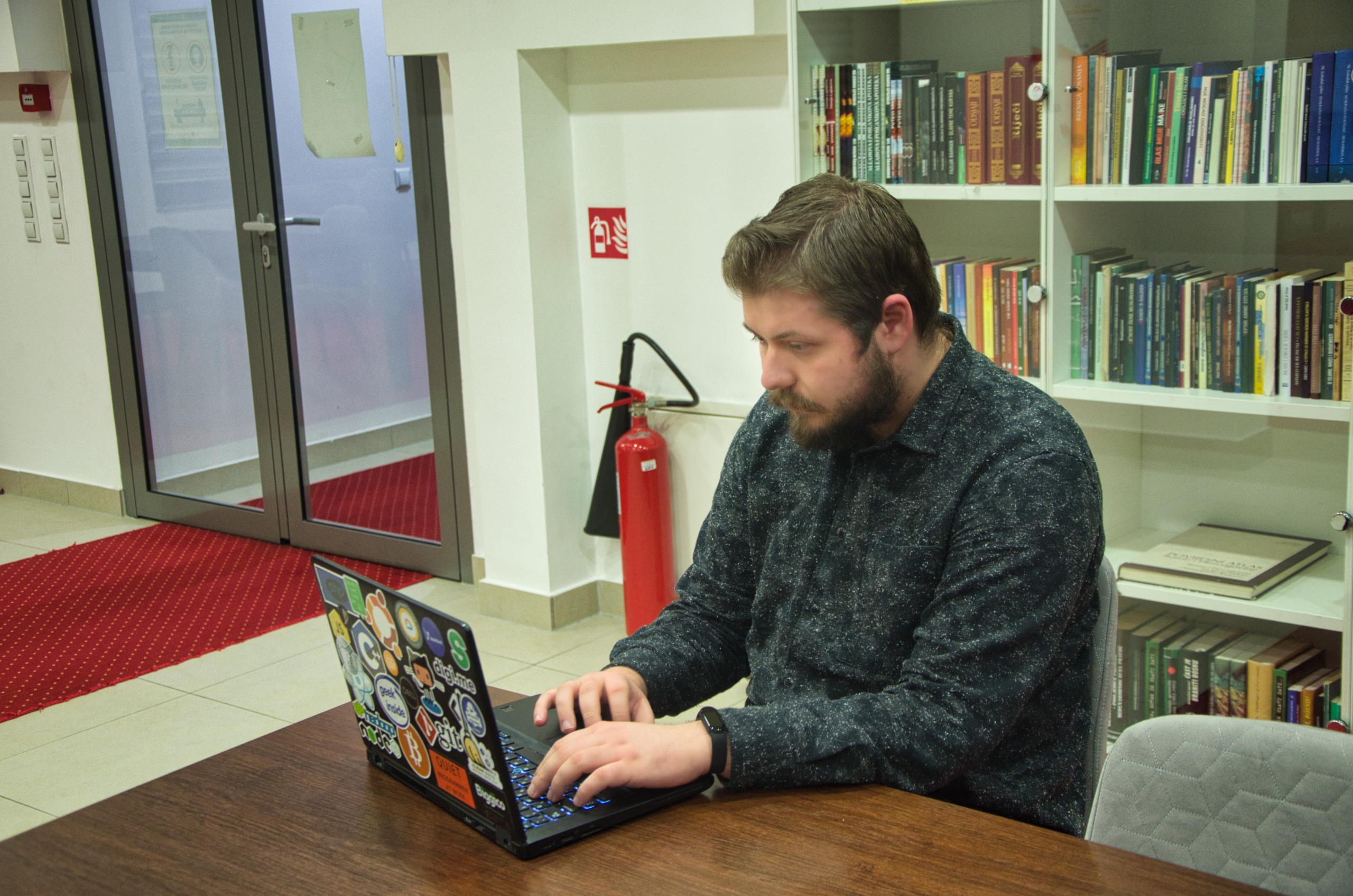
You are also a scholarship holder of the Source of Hope Foundation, and a member of the several teams. Are you satisfied with what the Foundation offers you and the cooperation you have been achieving for several years in a row?
I think that this question already contains an answer: if I were not satisfied with my work and position in the Foundation, I would not return to its fold again, for the fifth year in a row. Since my first year of college, and my first year at the Foundation, the Foundation and its staff have always been willing to listen to me, support my ideas, and provide valuable advice. Through the Foundation, I had the opportunity to participate in numerous projects that deepened my understanding and taught me something new. In addition, I met a lot of new colleagues and made acquaintances that I am sure will be useful in future life situations. I am really grateful to the Foundation for its help and support that has been shown to me over the years, and I sincerely hope that the Foundation is also satisfied with my work and contribution.
If you had to explain to others why you are different from others, what would you say?
Honestly, I’m not sure how best to answer this question. I never looked at myself as different from the others. But if I had to choose one of my traits that helped me a lot, I would say that it is a constant desire for progress. In everything I do, I have always urged myself to perform my tasks as well, effectively and efficiently as possible. If I saw an opportunity to do something more or more advanced, I took that option. I aspired to be the best or among the best in the things I do, but not for the reason that I could later praise myself about my achievements, but to use the acquired skills to achieve even greater success and help my environment. I believe that it was this desire for progress and constant innovation that enabled me to achieve many of my successes, and gave me the motivation to move forward constantly.
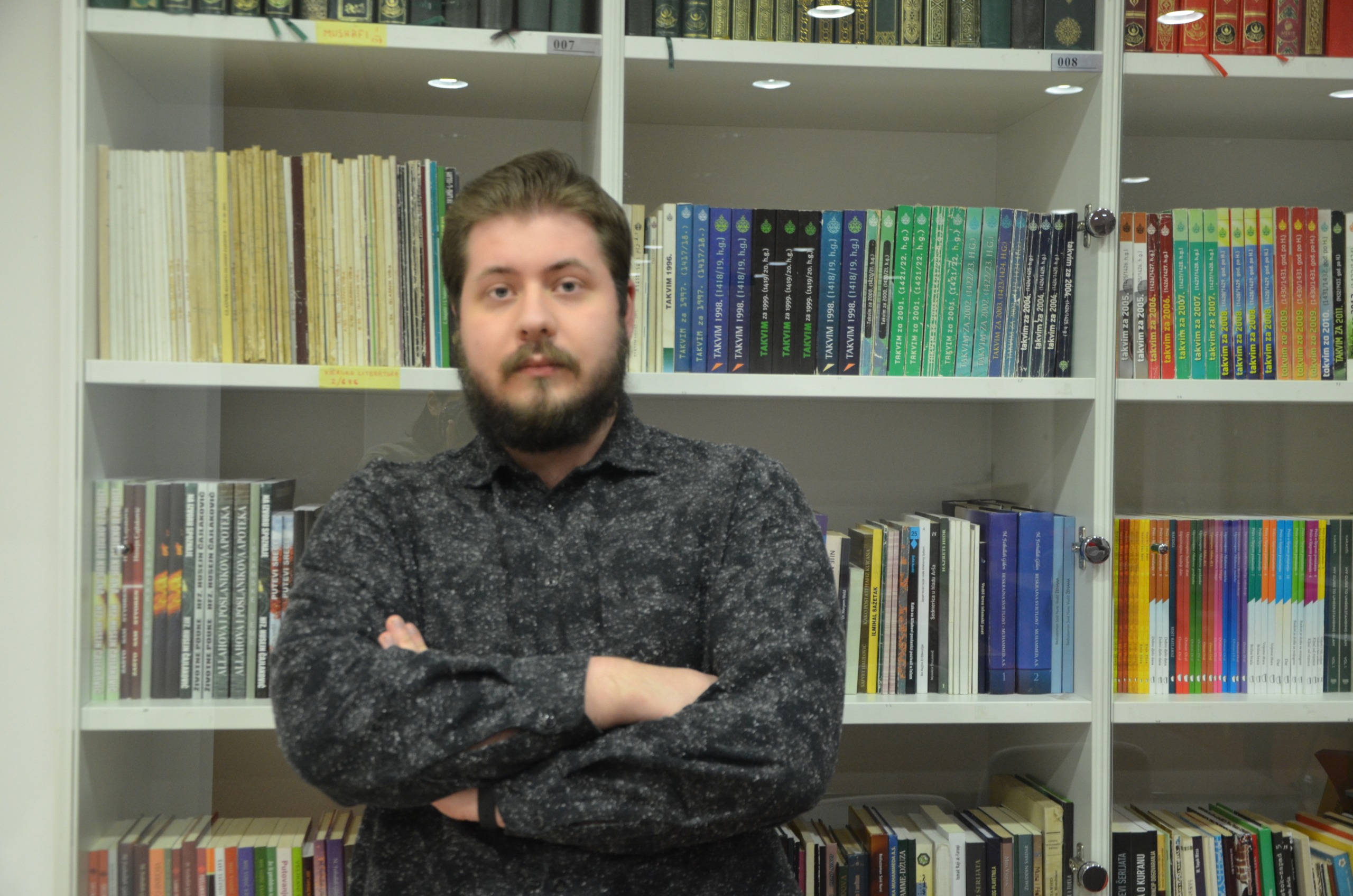
What are your future plans? Do you see yourself more in academia or industry?
For now, my main “short-term” plan is to successfully write a master’s thesis and complete a master’s degree. After that, I would like to enroll in a doctoral program, which would complete my education. However, while I may sound a little contradictory, I see myself more in the industry than in the academy. Although I am currently an assistant professor at the university and plan to complete my doctoral studies, my final wish is not to be a professor. One of the main reasons why I continued with my master’s degree (and my doctoral plan) is not the desire to continue working at the academy, but the aspect of writing scientific papers and seminars, which I find very interesting. As I said earlier, I have always loved finding solutions to problems, and now I have the opportunity to write analytically about those solutions, and have other people read them. Although I like to transfer my knowledge and share experiences with other students, I think I would be much more useful and productive in an industrial position, because I prefer more specific tasks. In my current job, I deal with Web programming and system administration, but my master’s degree is “data science”. Therefore, in the future I would like to deal with some of the topics in this area, such as e.g. data analysis and data processing, machine learning, natural language processing (NLP), etc. And of course, I can always maintain that “academic” aspect in my free time, where I will share my knowledge with the people around me.
What message would you send to all young people in our country who strive for success?
At the risk of saying a few “cliché” sentences at the end, I would say that the most important thing is to have strong motivation and perseverance in all the plans you have. I will use my example: when I first came to the Department of Information Technology, I didn’t have very much prior knowledge of programming, other than the basics I picked up in elementary and high school. I have never encountered some types of programming, such as Web and blockchain programming. However, I had a goal and motivation: I want to do programming and be among the best in the field. And I urged that goal: I studied regularly, both in college and through other additional materials and self-interest. In the second semester of my first year, I started working on the first basics of Web projects. In my second year of college, I got an eight-month paid internship. Since the third year, I have had a permanent job, where I work with technologies and matters that I had never dreamed of only a year before. Therefore, to summarize: success and progress are quite possible. The most important thing is to clarify to ourselves what goals we are striving for, and to make a firm decision to persevere in our efforts. I have succeeded in my plans so far, and I sincerely hope that all young people who want to make a name for themselves in Bosnia and Herzegovina will succeed in their intentions, with motivation and perseverance.
Prepared by: Nermin Đuzić
Iz kategorije izdvajamo
Summer school for children from diaspora - LOST IN BIH
There are rules we constantly learn, but never truly adopt and understand. One of them is difficult, relentless, and always ...
March 25, 2022
'Iftars 2022' - For new explorations and discoveries!
Dear donors, scholarship holders, activists and friends of the Source of Hope Foundation, Evoking all the searches, values, benefactors, encounters ...
March 23, 2022
Young people learned about entrepreneurship
Last weekend, from December 17th to 19th, at the hotel “Ibis Styles Sarajevo”, activists of the “Source of Hope Foundation” ...
